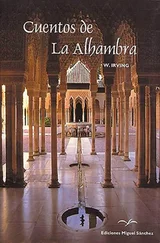Washington Irving - The Alhambra
Здесь есть возможность читать онлайн «Washington Irving - The Alhambra» — ознакомительный отрывок электронной книги совершенно бесплатно, а после прочтения отрывка купить полную версию. В некоторых случаях можно слушать аудио, скачать через торрент в формате fb2 и присутствует краткое содержание. Жанр: unrecognised, на английском языке. Описание произведения, (предисловие) а так же отзывы посетителей доступны на портале библиотеки ЛибКат.
- Название:The Alhambra
- Автор:
- Жанр:
- Год:неизвестен
- ISBN:нет данных
- Рейтинг книги:5 / 5. Голосов: 1
-
Избранное:Добавить в избранное
- Отзывы:
-
Ваша оценка:
- 100
- 1
- 2
- 3
- 4
- 5
The Alhambra: краткое содержание, описание и аннотация
Предлагаем к чтению аннотацию, описание, краткое содержание или предисловие (зависит от того, что написал сам автор книги «The Alhambra»). Если вы не нашли необходимую информацию о книге — напишите в комментариях, мы постараемся отыскать её.
The Alhambra — читать онлайн ознакомительный отрывок
Ниже представлен текст книги, разбитый по страницам. Система сохранения места последней прочитанной страницы, позволяет с удобством читать онлайн бесплатно книгу «The Alhambra», без необходимости каждый раз заново искать на чём Вы остановились. Поставьте закладку, и сможете в любой момент перейти на страницу, на которой закончили чтение.
Интервал:
Закладка:
Among other ill-starred enterprises, he undertook a great campaign, in conjunction with the king of Morocco, against the kings of Castile and Portugal, but was defeated in the memorable battle of Salado, which had nearly proved a death-blow to the Moslem power in Spain.
Yusef obtained a long truce after this defeat, and now his character shone forth in its true lustre. He had an excellent memory, and had stored his mind with science and erudition; his taste was altogether elegant and refined, and he was accounted the best poet of his time. Devoting himself to the instruction of his people and the improvement of their morals and manners, he established schools in all the villages, with simple and uniform systems of education; he obliged every hamlet of more than twelve houses to have a mosque, and purified the ceremonies of religion, and the festivals and popular amusements, from various abuses and indecorums which had crept into them. He attended vigilantly to the police of the city, establishing nocturnal guards and patrols, and superintending all municipal concerns. His attention was also directed towards finishing the great architectural works commenced by his predecessors, and erecting others on his own plans. The Alhambra, which had been founded by the good Alhamar, was now completed. Yusef constructed the beautiful Gate of Justice, forming the grand entrance to the fortress, which he finished in 1348. He likewise adorned many of the courts and halls of the palace, as may be seen by the inscriptions on the walls, in which his name repeatedly occurs. He built also the noble Alcazar or citadel of Malaga, now unfortunately a mere mass of crumbling ruins, but which most probably exhibited in its interior similar elegance and magnificence with the Alhambra.
The genius of a sovereign stamps a character upon his time. The nobles of Granada, imitating the elegant and graceful taste of Yusef, soon filled the city of Granada with magnificent palaces; the halls of which were paved with mosaic, the walls and ceilings wrought in fretwork, and delicately gilded and painted with azure, vermilion, and other brilliant colors, or minutely inlaid with cedar and other precious woods; specimens of which have survived, in all their lustre, the lapse of several centuries. Many of the houses had fountains, which threw up jets of water to refresh and cool the air. They had lofty towers also, of wood or stone, curiously carved and ornamented, and covered with plates of metal that glittered in the sun. Such was the refined and delicate taste in architecture that prevailed among this elegant people; insomuch that, to use the beautiful simile of an Arabian writer, “Granada, in the days of Yusef, was as a silver vase filled with emeralds and jacinths.”
One anecdote will be sufficient to show the magnanimity of this generous prince. The long truce which had succeeded the battle of Salado was at an end, and every effort of Yusef to renew it was in vain. His deadly foe, Alfonso XI. of Castile, took the field with great force, and laid siege to Gibraltar. Yusef reluctantly took up arms, and sent troops to the relief of the place. In the midst of his anxiety, he received tidings that his dreaded foe had suddenly fallen a victim to the plague. Instead of manifesting exultation on the occasion, Yusef called to mind the great qualities of the deceased, and was touched with a noble sorrow. “Alas!” cried he, “the world has lost one of its most excellent princes; a sovereign who knew how to honor merit, whether in friend or foe!”
The Spanish chroniclers themselves bear witness to this magnanimity. According to their accounts, the Moorish cavaliers partook of the sentiment of their king, and put on mourning for the death of Alfonzo. Even those of Gibraltar, who had been so closely invested, when they knew that the hostile monarch lay dead in his camp, determined among themselves that no hostile movement should be made against the Christians. The day on which the camp was broken up, and the army departed, bearing the corpse of Alfonzo, the Moors issued in multitudes from Gibraltar, and stood mute and melancholy, watching the mournful pageant. The same reverence for the deceased was observed by all the Moorish commanders on the frontiers, who suffered the funeral train to pass in safety, bearing the corpse of the Christian sovereign from Gibraltar to Seville.[6]
Yusef did not long survive the enemy he had so generously deplored. In the year 1354, as he was one day praying in the royal mosque of the Alhambra, a maniac rushed suddenly from behind and plunged a dagger in his side. The cries of the king brought his guards and courtiers to his assistance. They found him weltering in his blood. He made some signs as if to speak, but his words were unintelligible. They bore him senseless to the royal apartments, where he expired almost immediately. The murderer was cut to pieces, and his limbs burnt in public to gratify the fury of the populace.
The body of the king was interred in a superb sepulchre of white marble; a long epitaph, in letters of gold upon an azure ground, recorded his virtues. “Here lies a king and martyr, of an illustrious line, gentle, learned, and virtuous; renowned for the graces of his person and his manners; whose clemency, piety, and benevolence were extolled throughout the kingdom of Granada. He was a great prince; an illustrious captain; a sharp sword of the Moslems; a valiant standard-bearer among the most potent monarchs,” &c.
The mosque still exists which once resounded with the dying cries of Yusef, but the monument which recorded his virtues has long since disappeared. His name, however, remains inscribed among the delicate and graceful ornaments of the Alhambra, and will be perpetuated in connection with this renowned pile, which it was his pride and delight to beautify.
THE MYSTERIOUS CHAMBERS
AS I was rambling one day about the Moorish halls, my attention was, for the first time, attracted to a door in a remote gallery, communicating apparently with some part of the Alhambra which I had not yet explored. I attempted to open it, but it was locked. I knocked, but no one answered, and the sound seemed to reverberate through empty chambers. Here then was a mystery. Here was the haunted wing of the castle. How was I to get at the dark secrets here shut up from the public eye? Should I come privately at night with lamp and sword, according to the prying custom of heroes of romance; or should I endeavor to draw the secret from Pépe the stuttering gardener; or the ingenuous Dolores, or the loquacious Mateo? Or should I go frankly and openly to Dame Antonia the chatelaine, and ask her all about it? I chose the latter course, as being the simplest though the least romantic; and found, somewhat to my disappointment, that there was no mystery in the case. I was welcome to explore the apartment, and there was the key.
Thus provided, I returned forthwith to the door. It opened, as I had surmised, to a range of vacant chambers; but they were quite different from the rest of the palace. The architecture, though rich and antiquated, was European. There was nothing Moorish about it. The first two rooms were lofty; the ceilings, broken in many places, were of cedar, deeply panelled and skilfully carved with fruits and flowers, intermingled with grotesque masks or faces.
The walls had evidently in ancient times been hung with damask; but now were naked, and scrawled over by that class of aspiring travellers who defile noble monuments with their worthless names. The windows, dismantled and open to wind and weather, looked out into a charming little secluded garden, where an alabaster fountain sparkled among roses and myrtles, and was surrounded by orange and citron trees, some of which flung their branches into the chambers. Beyond these rooms were two saloons, longer but less lofty, looking also into the garden. In the compartments of the panelled ceilings were baskets of fruit and garlands of flowers, painted by no mean hand, and in tolerable preservation. The walls also had been painted in fresco in the Italian style, but the paintings were nearly obliterated; the windows were in the same shattered state with those of the other chambers. This fanciful suite of rooms terminated in an open gallery with balustrades, running at right angles along another side of the garden. The whole apartment, so delicate and elegant in its decorations, so choice and sequestered in its situation along this retired little garden, and so different in architecture from the neighboring halls, awakened an interest in its history. I found on inquiry that it was an apartment fitted up by Italian artists in the early part of the last century, at the time when Philip V. and his second wife, the beautiful Elizabetta of Farnese, daughter of the Duke of Parma, were expected at the Alhambra. It was destined for the queen and the ladies of her train. One of the loftiest chambers had been her sleeping-room. A narrow staircase, now walled up, led up to a delightful belvidere, originally a mirador of the Moorish sultanas, communicating with the harem; but which was fitted up as a boudoir for the fair Elizabetta, and still retains the name of el tocador de la Reyna , or the queen’s toilette.
Читать дальшеИнтервал:
Закладка:
Похожие книги на «The Alhambra»
Представляем Вашему вниманию похожие книги на «The Alhambra» списком для выбора. Мы отобрали схожую по названию и смыслу литературу в надежде предоставить читателям больше вариантов отыскать новые, интересные, ещё непрочитанные произведения.
Обсуждение, отзывы о книге «The Alhambra» и просто собственные мнения читателей. Оставьте ваши комментарии, напишите, что Вы думаете о произведении, его смысле или главных героях. Укажите что конкретно понравилось, а что нет, и почему Вы так считаете.












